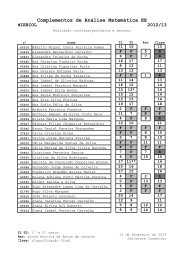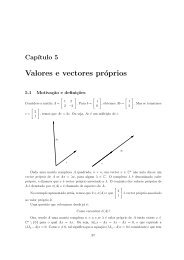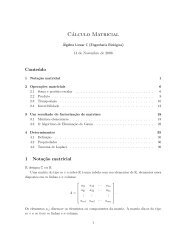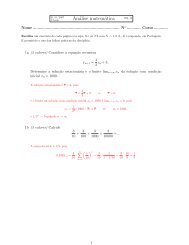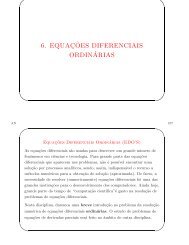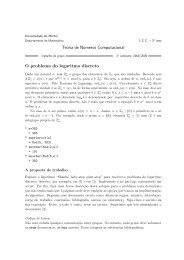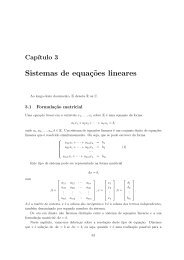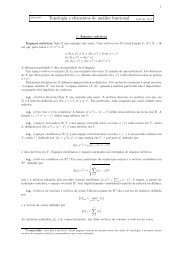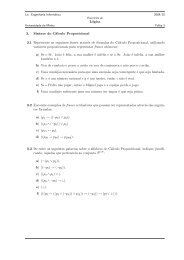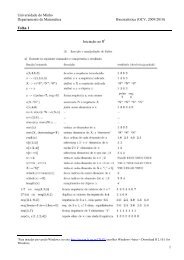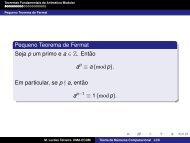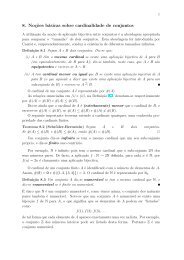My title - Departamento de Matemática da Universidade do Minho
My title - Departamento de Matemática da Universidade do Minho
My title - Departamento de Matemática da Universidade do Minho
You also want an ePaper? Increase the reach of your titles
YUMPU automatically turns print PDFs into web optimized ePapers that Google loves.
4<br />
NÚMEROS E DINÂMICA 30<br />
Algebraic and transcen<strong>de</strong>ntal numbers. Algebraic numbers are the roots of polynomials with<br />
integer coefficients. The <strong>de</strong>gree of the algebraic number x is the minimal <strong>de</strong>gree of a polynomial<br />
p ∈ Z[x] such that p(x) = 0. So, algebraic numbers of <strong>de</strong>gree 1 are the rational numbers, algebraic<br />
numbers of <strong>de</strong>gree 2 are the quadratic irrationals, and so on. Numbers which are not algebraic are<br />
called transcen<strong>de</strong>ntal, and the natural problems are: <strong>do</strong> they exist could we write some of them<br />
<strong>do</strong> we recognize them<br />
Let us say that a number x is approximable to or<strong>de</strong>r n if there exists a constant λ(x) (which<br />
may <strong>de</strong>pend on x) such that the inequality<br />
∣ x − p q ∣ < λ(x)<br />
q n .<br />
admits infinite rational solutions p/q.<br />
Liouville theorem. A real algebraic number of <strong>de</strong>gree n is not approximable to or<strong>de</strong>r > n.<br />
Proof. Let x be an algebraic number of <strong>de</strong>gree n, and f(x) = ax n + bx n−1 + · · · ∈ Z[x] be a<br />
polynomial of <strong>de</strong>gree n such that f(x) = 0. Let p/q be a rational approximation to x. We may<br />
assume that p/q belongs to an interval I = (x − ε, x + ε) around x so small that the polynomial<br />
f(x) has no other root than x, and has boun<strong>de</strong>d <strong>de</strong>rivative, say |f ′ (y)| < L if y ∈ I. Then<br />
|f(p/q)| = |apn + bp n−1 q + . . . |<br />
q n ≥ 1<br />
q n<br />
since the numerator is a positive integer. By the mean value theorem<br />
|f(p/q)| = |f(x) − f(p/q)| = |f ′ (y)| · |x − p/q| ≤ L · |x − p/q|<br />
for some y ∈ I. Putting together the two inequalities we get<br />
|x − p/q| ≥ L−1<br />
q n<br />
Existence and construction of transcen<strong>de</strong>ntal numbers. Liouville theorem shows that<br />
transcen<strong>de</strong>ntal numbers <strong>do</strong> exist! Moreover, it allows us to give some examples: it is sufficient to<br />
produce numbers which are approximable to any or<strong>de</strong>r. The example in [HW59] is<br />
0.1100010000000000000000010 · · · = 1<br />
10 1! + 1<br />
10 2! + 1<br />
10 3! + 1<br />
10 4! + . . .



